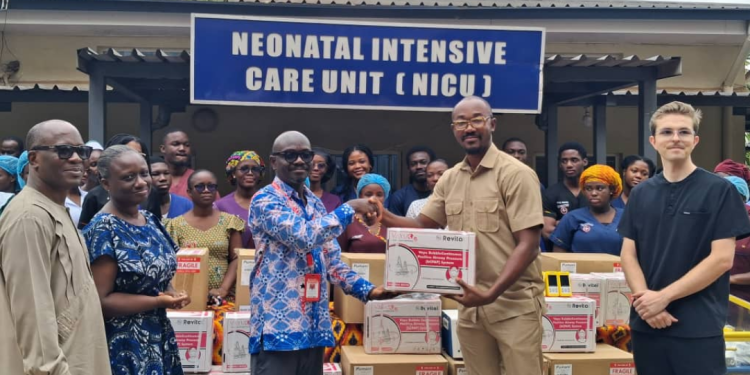
Africa Eye Imaging Centre in collaboration with Zero Blind Babies has donated neonatal support equipment worth $67,000 to the Neonatal Intensive Care Unit (NICU) of the Komfo Anokye Teaching Hospital (KATH), in a bid to improve the care and outcomes of premature babies in Ghana.
The donation, which included 20 neonatal oximeter probe (oxygen blenders) , 20 lifebox pulse oximeter (patient monitors) , and respiratory support devices (15 Pumani bubble CPAP and 10 Vayu bubble CPAP) , is aimed at strengthening the hospital’s capacity to prevent Retinopathy of Prematurity (ROP), a preventable eye condition that can lead to blindness in preterm infants and to provide improved neonatal oxygen management.
ROP occurs when the retina, a vital part of the eye responsible for vision, fails to develop properly due to premature birth, particularly in infants born before 30 weeks of gestation or weighing less than two kilograms. With advances in neonatal care and the increasing number of preterm births due to factors such as IVF and improved survival rates, early detection and management of ROP have become crucial.
Over the past year, Africa Eye Imaging Centre has partnered with KATH to pilot the first ROP screening program of its kind in sub-Saharan Africa, using a portable retinal imaging camera worth $30,000. Since the inception of the program in August 2024, more than 3,000 eye screenings have been conducted for preterm babies across the Ashanti Region, with over 25 babies treated successfully to prevent irreversible blindness.
Dr. Akwasi Agyeman Ahmed, CEO of Africa Eye Imaging Centre and a consultant ophthalmologist at KATH, said the intervention was born out of necessity after witnessing a growing number of blind preterm infants at the hospital’s eye unit.
“This could have been prevented if the babies were screened early. So, in collaboration with a US-based NGO, Zero Blind Babies, we started this program to ensure no child starts life blind when it can be avoided with a simple intervention,” he said.
“In the United States, if a baby becomes blind from ROP in a hospital, that facility can be sued for up to $40 million because it is considered preventable. We must prioritise this in Ghana too.”
The programme has since expanded to include Accra Regional Hospital (formerly Ridge Hospital) and Tamale Teaching Hospital, with a total of three functional ROP screening centers currently operating across the country.
Dr. Ahmed also highlighted that one of the risk factors for ROP is improper oxygen management. Preterm babies are often given 100% oxygen, which can be harmful. The oxygen blenders now donated will help adjust oxygen concentration appropriately, protecting the babies’ eyes and overall health.
The Neonatal Intensive Care Unit at Komfo Anokye Teaching Hospital (KATH) is a 130-bed capacity unit, but suffers from severe shortages in monitoring equipment and respiratory support devices. Currently, there are fewer than 20 monitors available, which means healthcare workers often have to rotate monitors between babies, prioritizing those in critical condition. Similarly, only about four or five respiratory support devices are available in the 18-bed acute preterm ward.
Dr. Naana Wireko Brobbey, a neonatologist and second head in charge of the Neonatal Intensive Care unit (NICU) at KATH welcomed the donation, saying it will greatly improve clinical outcomes and reduce neonatal mortality and morbidity.
”Now with these donated oxygen blenders, monitors, and breathing devices, we can better manage oxygen therapy and monitor the babies more effectively. It’s a game-changer in our practice,” she said.
“With improved screening and better equipment, we are certainly on our way to improving neonatal care outcomes and achieving the Sustainable Development Goals.”




